Thiago Silva has been a key part of PSG’s success for nearly a decade. However, everything must come to an end. This is why everything indicates that 35-year-old Thiago Silva will not renew his contract. He still has a chance to end his stay at PSG with the great triumph that could be winning the UEFA Champions League. At the time of writing, they are set to compete in the final.
It is unclear where Silva will end his career, but PSG need to be ready for his departure. This is why they need to have a replacement ready. This substitute could be experienced or a young, future star. We have made this data analysis to search for a potential replacement for Silva.
This research is based on certain data and statistics and does not evaluate other data. Therefore, this analysis serves to be a starting point to find a suitable replacement for Silva. A more detailed analysis of the players and watching them live would be needed to get a whole understanding of the players.
Selection criteria
For this report, we will find potential replacements from centre-backs in the top five leagues. These leagues are Premier League, La Liga, Serie A, Bundesliga, and Ligue 1. We do this because these leagues contain most of the best players in professional football. This is needed as Thiago Silva has been one of the best centre-backs in Europe these seasons and so the replacement has to be of a high level.
We have also only looked at players who are 29 or younger. PSG will want their centre-back to be relatively young or to have many more years of football ahead, hence the age restriction. Additionally, the players researched have played a minimum of 1000 minutes this season, to make sure there is a fair comparison between players.
This avoids players having inflated statistics because maybe a centre-back has played fewer minutes, and so, has better stats, but this does not make him a better player.
Defensive duels
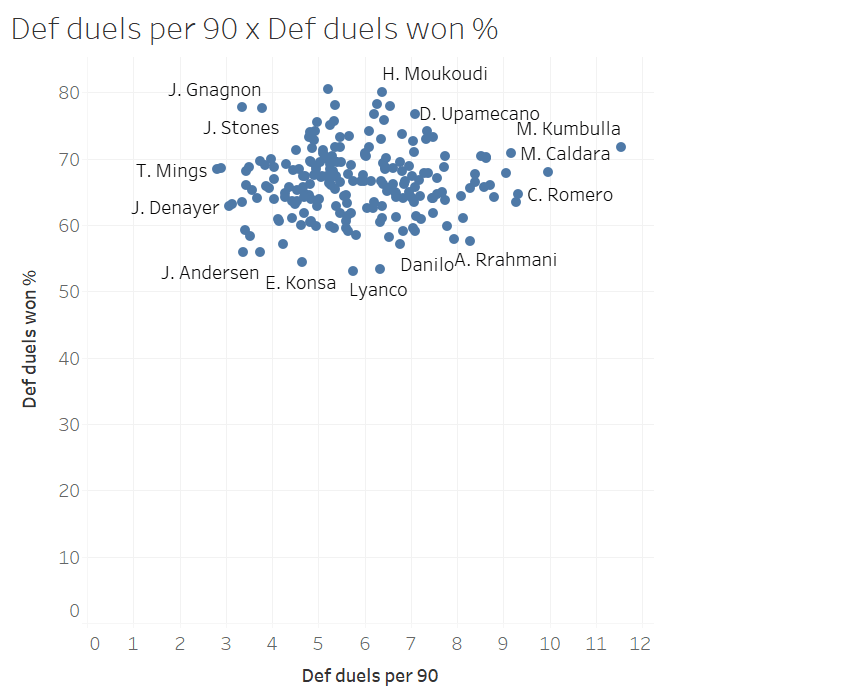
The defending duels for a PSG centre-back are very important. Since they are a team that dominates in their league, they need to be very effective in their defensive duels. Thus, we are essentially looking at players with a high success rate and not as much at the number of defensive duels. This is because PSG centre-backs do not make many defensive duels as they usually have possession of the ball.
To use him as a benchmark, this season Silva made 3.85 defensive duels per game with a 71.83% success rate.
Marash Kumbulla from Hellas Verona has the best statistics in this aspect, making 11.55 defensive duels per game with a 71.8% success rate. He makes many defensive duels per game and still manages to keep a higher success rate than Silva which is impressive.
Dayot Upamecano from RB Leipzig also has great stats. He makes 7.09 defensive duels per game and has a 76.65% success rate. This is still a substantial number of defensive duels and achieves a very high success rate.
The player from Ligue 1 with decent numbers and who has the second-highest success rate is Harold Moukoudi from Saint-Étienne. He makes 6.38 defensive duels per game with an 80% success rate.
PAdj Interceptions and Shots blocked
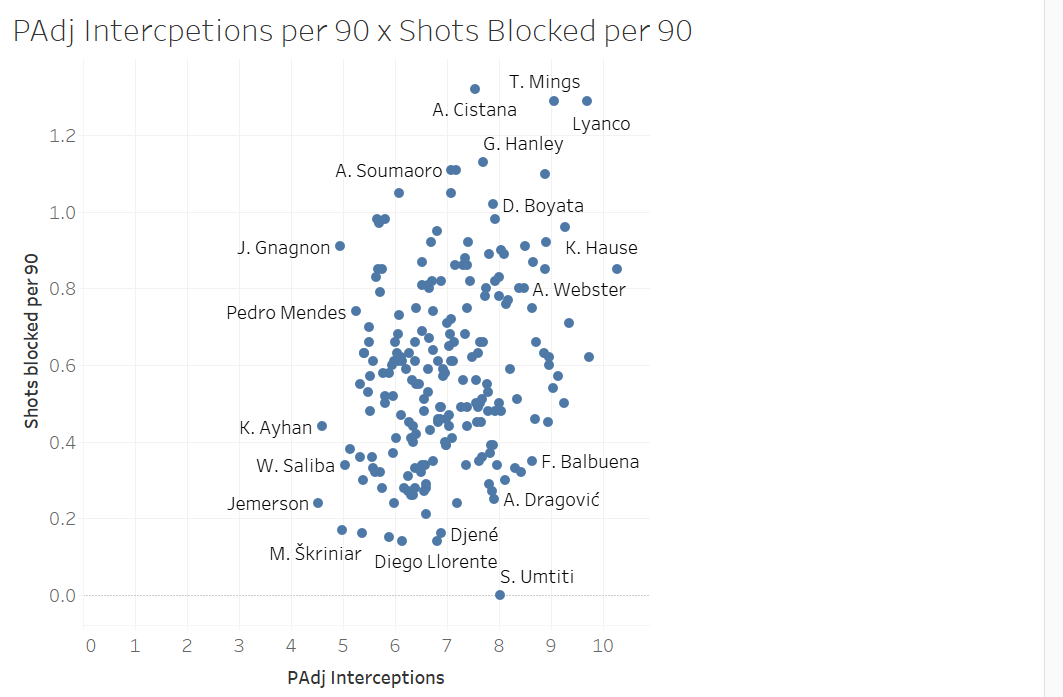
To be a solid defender, you need to be an intelligent player and read the game correctly. If so, making interceptions to disrupt the opponent’s play becomes easier. This is especially important for a PSG defender who has to quickly stop the opponents before they can start a counterattack.
To measure this, we will use PAdj interceptions. Possession-adjusted metrics are a method to calculate defensive statistics that take possession values into account.
As for shots blocked, it proves a centre-back’s positioning and defensive ability. For a PSG defender such as Silva this is useful because the few times that the opponents reach PSG’s area, no danger can be created.
Once again, we will use Silva’s statistics as benchmarks. He makes 8.1 PAdj interceptions per game and blocks 0.87 shots per game.
Lyanco Evangelista from Torino has the best combined numbers here. He makes 9.68 PAdj interceptions and 1.29 shots blocked per game. Both of these statistics are higher than Silva’s.
Tyrone Mings from Aston Villa has the second-highest statistics, making 9.05 PAdj interceptions and 1.29 blocked shots per game.
James Tarkowski from Burnley also has good numbers, making 8.88 PAdj interceptions and 1.10 blocked shots per game.
It is also worth mentioning Andrea Cistana from Brescia (7.54, 1.32) and Kortney Hause, also from Aston Villa (10.27, 0.85).
Progressive passes
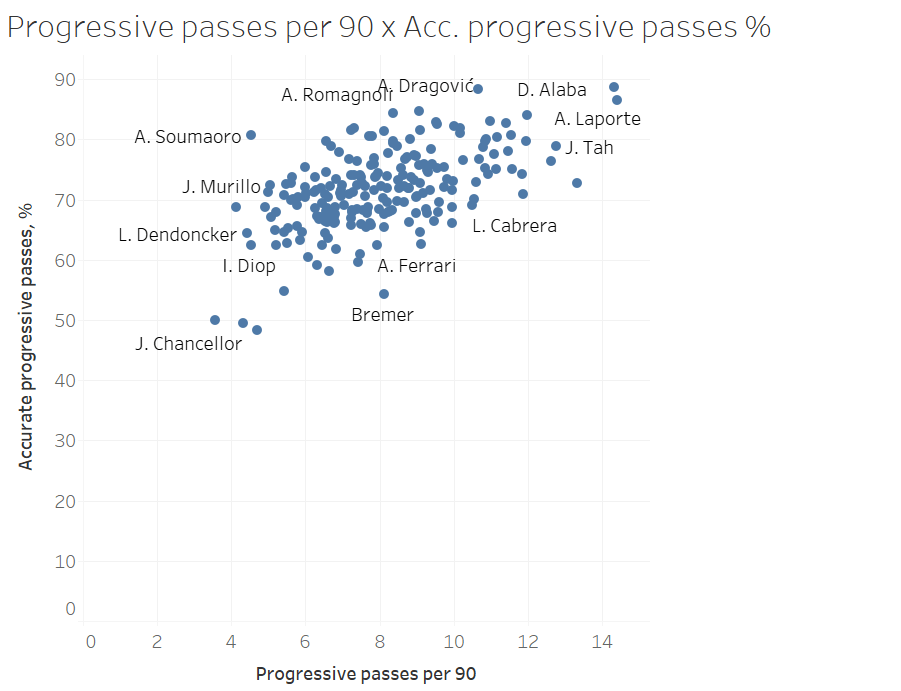
Moving on to the passing metrics, this is probably one of the key metrics in deciding the replacement for Silva. A progressive pass is a forward pass that attempts to advance a team significantly closer to the opponent’s goal.
Since PSG control possession, it is mostly the centre-backs who start the build-up. The PSG centre-backs need to be gifted on the ball and have a great passing ability to dominate possession in games.
In this aspect, Silva has amazing statistics. He makes 11.87 progressive passes per game with a success rate of 90.41%.
David Alaba from Bayern Munich has the highest statistics in this metric. He makes an astonishing 14.32 progressive passes per game and has a success rate of 88.76%. This means that he makes more progressive passes per game but has a worse success rate. However, this could be attributed to the higher number of passes.
Aymeric Laporte from Manchester City has the second-best numbers. He makes 14.41 progressive passes per game with a success rate of 86.56%. The same happens here, with Laporte making more progressive passes per game but having a lower success rate.
Another player with good stats is Upamecano who makes 11.95 progressive passes per game with a success rate of 79.82%.
Also worth mentioning are Jonathan Tah from Bayer Leverkusen (12.75, 78.91%) and Aleksandar Dragović from the same team (10.64, 88.37%).
Forward passes
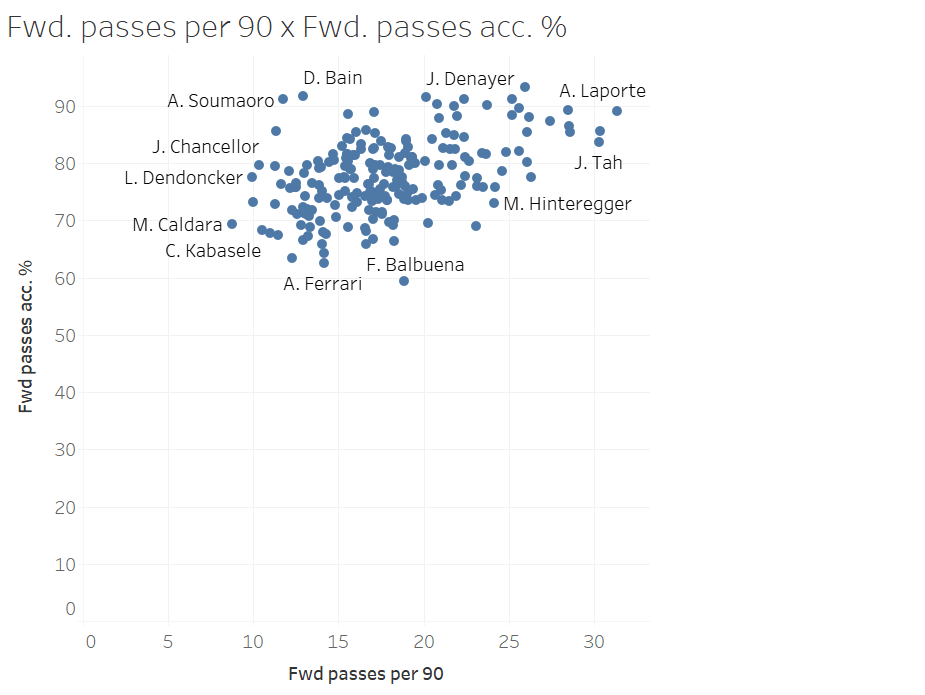
Forward passes are meant to break lines. They are used to cut through the opponents by passing it through them and so create danger through the middle. For PSG, these passes in a centre-back are important as they try to connect with the talented attackers as much as possible.
When Silva has the ball, the first option he looks for is a forward pass that breaks through the midfield line to pass into the attack. He makes 27.63 forward passes per game with a success rate of 92.35% which is impressive.
Laporte appears again. He makes 31.37 forward passes per game and has a success rate of 89.14%. He makes more forward passes per game but has a lower success rate.
Alaba also shows up again with 30.35 passes per game and an 85.55% success rate. He is followed by Dragović who makes 28.54 forward passes per game with a success rate of 86.42%. It is interesting to see how the players who did well in their progressive passes also do well in their forward passes.
Worth noting are Dan-Axel Zagadou from Borussia Dortmund (28.61 and 85.41%) and Kalidou Koulibaly from Napoli (27.43 and 87.46%).
The shortlist
After this data analysis, we have found three centre-backs that PSG could concentrate on to replace Silva.
Aymeric Laporte
The first suggestion is Laporte, from Manchester City. Since he is from a team that also dominates possession in their league, the transition would be easier. The statistics where he does best in concern his passing ability. He is also 26 years old, meaning he is still relatively young.
He was the second-best in the metric of progressive passes and the best with forward passes. This is very important since Silva also had high statistics for these metrics. Laporte had a lower success rate than Silva but also made more passes.
Moving on to his defensive statistics, he also makes few defensive duels (3.56) because his team usually has the ball so there is less need for defensive actions. However, he needs to improve in his success rate (65.22) because a PSG centre-back needs to be more decisive when he intervenes, to swiftly cut out an opponent’s attack.
He also makes 6.24 PAdj interceptions per game and blocks 0.31 shots per game. He needs to improve in both aspects. Nonetheless, this statistic might occur since Manchester City is vastly superior to many teams they play and so, the opponents attack less. Therefore, there would be fewer chances to fulfil these metrics.
David Alaba
Alaba has the same situation as Laporte. He is from a team that won the league in the Bundesliga and is used to control possession. This is why he also does best in his passing ability. Moreover, he is 28 years old, meaning he is an experienced player.
He was the best in the progressive passes and second-best in his forward passes. This proves he is used to building up from the back and being decisive in his passes to advance Bayern Munich’s play. This is exactly what is needed at PSG.
As for his defensive abilities, he makes few defensive duels (4.28) and has a worse success rate than Silva (64.8%). He is in the same situation as Laporte, where he needs to be more solid in his defensive duels to not allow the opponent any chance in the attack.
Alaba makes the same PAdj interceptions as Laporte (6.24) but blocks fewer shots per game (0.27). This is another factor he should improve in to be the perfect replacement for Silva.
Dayot Upamecano
The RB Leipzig centre-back is by far the player with the most potential as he is only 21 years old. If he is lacking in some metrics, he has plenty of time to improve them but the fact that he has great stats already shows his talent.
The metrics where he did the best were in his defensive duels and his progressive passes. Contrary to the other two players, he is not from a team that usually dominate games. This is why he makes 7.09 defensive duels per game with a success rate of 76.65%.
This means he makes more defensive duels than Silva and still manages to have a higher success rate than him.
The next metric where he does well is his progressive passes. He makes 11.95 progressive passes per game with a 79.82% success rate. Thus, he makes slightly more progressive passes per game but has a lower percentage in his success rate which is something to improve on.
He does worse in his PAdj interceptions (7.56) and shots blocked per game (0.5), with both metrics being less than Silva’s. As for forward passes, he also has lesser stats than those of Silva (25.6 forward passes per game with a success rate of 82.14%).
Even though he has good numbers in these metrics, they are still not to the level of Silva but as mentioned before, he is young and has time to improve.
Conclusion
This data analysis has shown us some useful metrics to measure PSG centre-backs. A PSG centre-back is meant to be decisive in his defensive duels and should have the technical ability to succeed in his progressive and forward passes. These metrics are essential for a team that dominate possession and can replace a PSG legend such as Silva.
This analysis also gave us three players which could be viable potential replacements for Silva. It is clear that Silva is a valuable player for PSG but if he was to be replaced by any of these three, that centre-back position would be well covered. Laporte, Alaba, and Upamecano are all quality players who have more than enough quality to replace Silva.


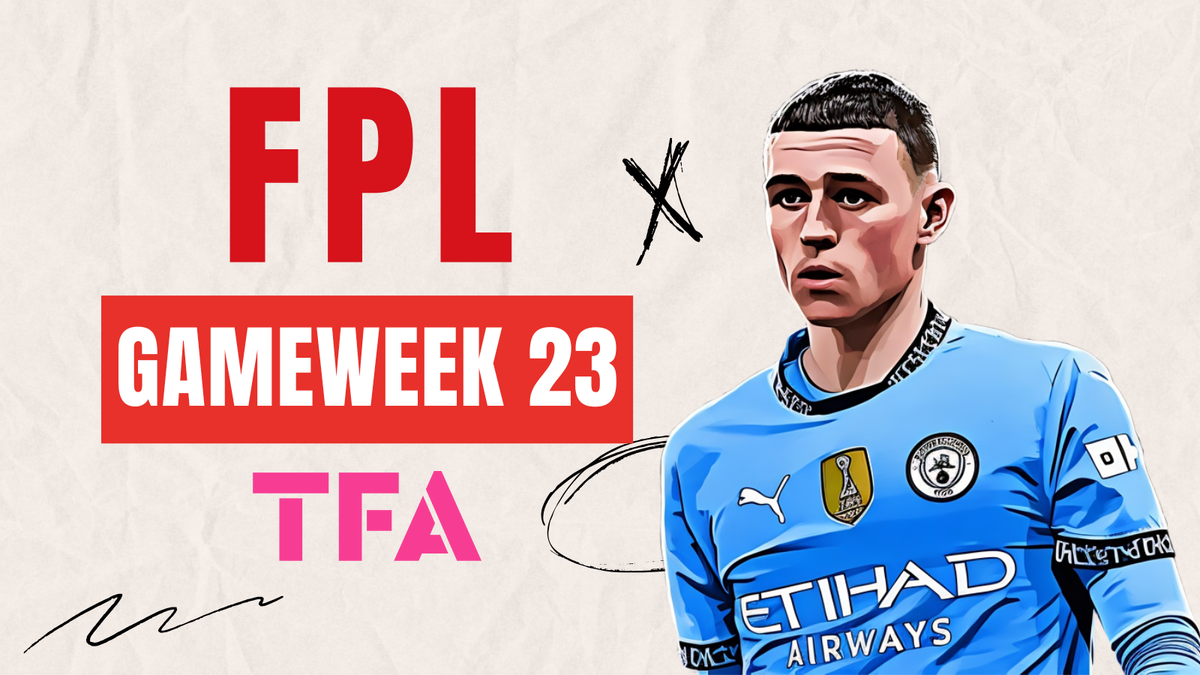
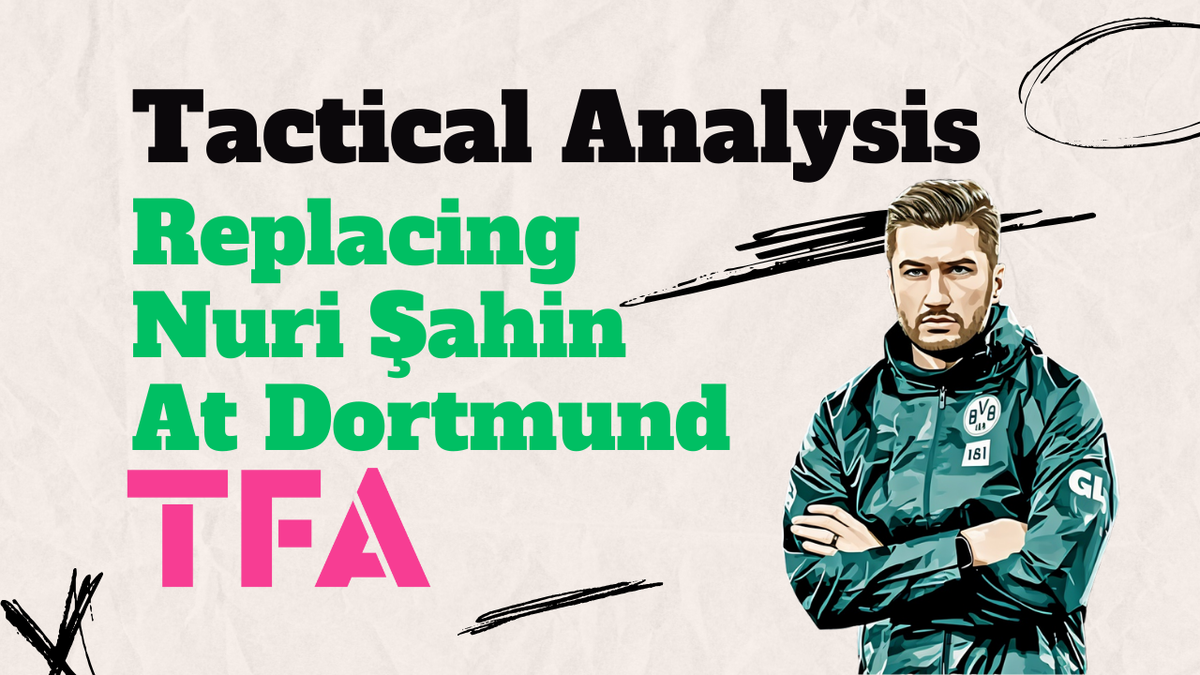
Comments